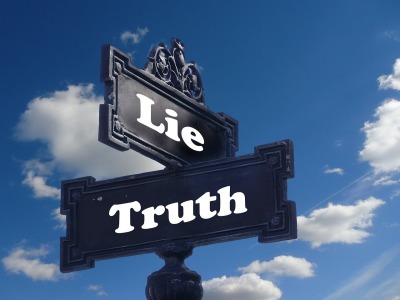My truth, your truth, or the truth? How wokeness undermines the concept of truth itself

In an interview with The Harvard Crimson, the disgraced plagiarist and ex-president of Harvard University, Claudine Gay, used some interesting language about “truth” — language that should make any Christian’s eyebrows pop up.
She said, “What I should have had the presence of mind to do in that moment was return to my guiding truth, which is that calls for violence against our Jewish community — threats to our Jewish students — have no place at Harvard, and will never go unchallenged …Substantively, I failed to convey what is my truth.”
But the use of the phrase “my truth” isn’t only found among the progressive left these days. In one of the Republican presidential primary debates, Nikki Haley, the former governor of South Carolina and United Nations ambassador, outlined her (rather weak) position on abortion and claimed to be pro-life. Later, when facing criticism for not being pro-life enough at a candidates forum in Iowa, she said “What you heard me say at the debate was very much my truth.”
This raises a serious question: Since when did truth become something that needs to be modified with a personal possessive pronoun?
Christian apologist Frank Turek, perhaps having witnessed these strange personal modifications to the concept of truth, recently asked on X (formerly Twitter), “What do you say to people when they talk about ‘their truth?’”
Ryan Helfenbein, Executive Director of the Standing for Freedom Center, gave an excellent answer:
“There is no ‘your’ truth or ‘my’ truth. There is only ever one universal and absolute truth. The language of postmodernity and indeed Wokism, is a total affront and assault on truth.
Jesus said, ‘I AM the Way, the Truth, and the Life. No one comes to the Father except through me.’ John 14:6. Appreciate this question from @DrFrankTurek.”
There is no “your” truth or “my” truth. There is only ever one universal and absolute truth. The language of postmodernity and indeed Wokism, is a total affront and assault on truth.
Jesus said, “I AM the Way, the Truth, and the Life. No one comes to the Father except through… https://t.co/kCNfgAluj9— Ryan Helfenbein (@RHelfenbein) January 3, 2024
Ryan is right. There is only “one universal and absolute truth.” And there is only one being in the universe who has a right to make a personal claim on that truth — the Triune Creator God.
But in today’s increasingly secular world, the concept of truth has become blurred. The rise of postmodernism and its offspring, wokeness, have contributed significantly to this confusion. As Christians, it is essential to understand the implications of these ideologies and how they impact our understanding of truth. Let’s explore the concept of this sort of subjective truth from a Christian worldview and examine how wokeness undermines the very idea of objective truth.
The Christian understanding of truth
The Bible, as the foundation of the Christian faith, provides a clear understanding of truth. In John 14:6, as Ryan referenced, Jesus declares, “I am the way, and the truth, and the life.” This statement reveals that Jesus is the embodiment of truth and that truth is not a concept or an abstract idea but a fixed reality determined by God and miraculously embodied in Jesus Christ through the incarnation.
Moreover, the Bible teaches that truth is not relative but absolute. In John 8:32, Jesus says,
“And you will know the truth, and the truth will set you free.”
This statement teaches us in no uncertain terms that there is a single, objective truth that can be known and that this truth has the power to liberate us from the chaos and confusion of the world — and, more importantly, from our sin and rebellion against the God of truth.
The rise of postmodernism and Wokeness
But how has even the concept of truth become so corrupted? First, through the presence of human sin. Questioning “the truth” is nothing new. When Jesus was brought before Pilate and interrogated about His identity, we learn in John 18:37-38 that Pilate was a “postmodernist” long before modernity even existed.
“’You are a king, then!’ said Pilate.
Jesus answered, ‘You say that I am a king. In fact, the reason I was born and came into the world is to testify to the truth. Everyone on the side of truth listens to me.’
‘What is truth?’ retorted Pilate.”
This interchange takes on amazing depth when you pause and realize that Pilate asked, “What is truth?”, while staring in the eyes of the very author and embodiment of truth.
Still, for hundreds of years after the life, death, and resurrection of Christ, most people understood that truth was not relative but fixed and that no one had the right to go around inventing “their truths.” This changed substantially with the rise of what’s known as postmodernism.
Postmodernism is a philosophical movement that emerged in the mid-20th century as a reaction to the Enlightenment and its emphasis on reason and objectivity. Postmodernism rejects the notion of objective truth, claiming that reality is a “mental construct” and therefore all truth is subjective and dependent on one’s perspective.
Wokeness, a mutated product of postmodern thought, strongly emphasizes the importance of personal experience and identity in shaping one’s understanding of truth. This ideology encourages individuals to embrace their own “truth” and to reject any notion of a universal or objective truth. In so doing, reality becomes unmoored from any semblance of reason or logic or immutable, biological fact. And so we arrive today where a man can claim to be a woman, a woman can claim to be a man, or someone can claim to have no gender — but then insist that society not only accept their self-identity but celebrate it. It’s their “truth” after all.
The consequences of Wokeness on the understanding of truth
The rise of wokeness and its rejection of objective truth have significant consequences for society. Here are some of the ways that wokeness undermines the concept of truth itself. Here are a few examples:
- The erosion of trust — When truth becomes subjective and personal, it becomes difficult to trust others and to build strong relationships. Without a shared understanding of truth, society becomes fragmented and divided.
- The loss of meaning — When truth is no longer objective and universal, it becomes difficult to find meaning and purpose in life. Without a solid foundation of truth, individuals are left to create their own meaning, leading to confusion and despair.
- The decline of morality — When truth is subjective, there is no longer a standard by which to judge right and wrong. This leads to moral relativism, where each person’s actions are justified by their own “truth.”
Conclusion
As Christians, it is our responsibility to stand firm in our understanding of truth as determined by God and revealed in the Bible. Wokeness, as a product of postmodern thought, must be seen as significantly contributing to the erosion of the concept of objective truth and simultaneously leading to the trendy but ultimately absurd idea of “my truth.” But by standing on the Bible, and embracing the truth of Jesus Christ, we can resist the destructive influence of wokeness and uphold the importance of objective truth in our lives and in our country today.
All truth is God’s truth, not “my truth,” “your truth,” or “their truth.” As Augustine is credited with saying, “The truth is like a lion; you don’t have to defend it. Let it loose; it will defend itself.”
Truth — true truth — never needs a possessive pronoun in front of it. If it does, it’s probably not the truth.
Originally published at the Standing for Freedom Center.
William Wolfe is a visiting fellow with the Center for Renewing America. He served as a senior official in the Trump administration, both as a deputy assistant secretary of defense at the Pentagon and a director of legislative affairs at the State Department. Prior to his service in the administration, Wolfe worked for Heritage Action for America, and as a congressional staffer for three different members of Congress, including the former Rep. Dave Brat. He has a B.A. in history from Covenant College, and is finishing his Masters of Divinity at The Southern Baptist Theological Seminary.
Follow William on Twitter at @William_E_Wolfe



























